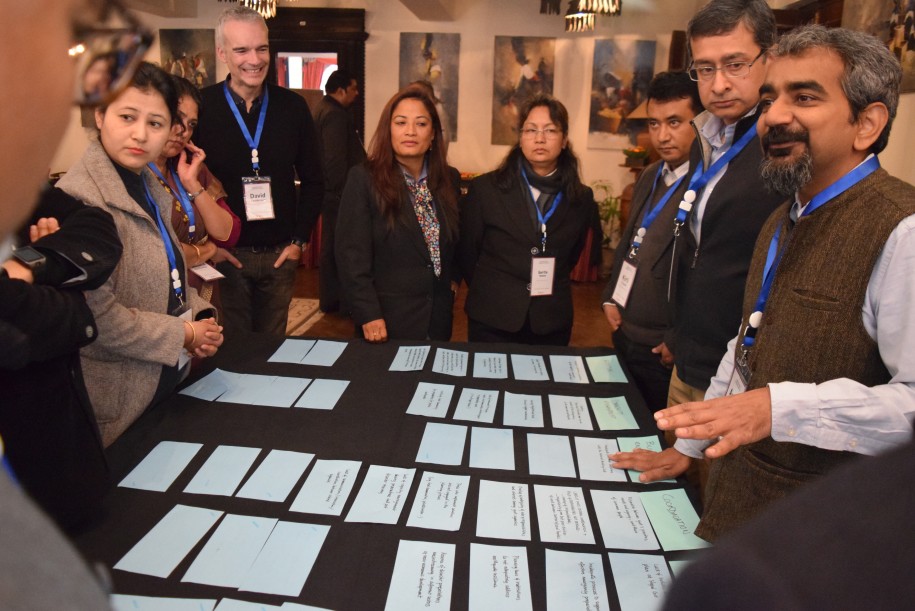Nepal Studies Program
About
The Nepal Studies Program was a three-year program that focused on a different faculty-led topic of interest each year. It engaged scholars and practitioners both in Cambridge and on the ground in Nepal. This program was created with generous support from Jeffrey M. Smith, a Principal Shareholder with the international law firm of Greenberg Traurig, LLP.
In the program’s first year in 2017, Jerold Kayden, Frank Backus Williams Professor of Urban Planning and Design at the Harvard Graduate School of Design, led a study on earthquake preparedness, with events in both Kathmandu and Cambridge.
In Year 2, Leonard van der Kuijp, Professor of Tibetan and Himalayan Studies at Harvard University, led an exploration of the spread and development of Buddhism in the India-Nepal corridor based on medieval documents and modern practice.
In Year 3, Michael Witzel, Wales Professor of Sanskrit at Harvard University, led an exploration of multiple aspects of Hindu religion in Nepal, delving into various rituals. This too was based on medieval documents and modern practice, with special attention placed on their co-existence and the mutual influences with related Buddhist rites.
Nepal encompasses, within the 100 miles from the Indian to the Tibetan border, all climates, from tropical rainforest to glacial deserts and the respective flora and fauna; as for the latter, the western and eastern Eurasian biospheres overlap on its territory, with remnants of Ice Age species. Human diversity matches this: there are 61 nationalities (janajaati) speaking Indo-European (Indo-Aryan), Tibeto-Burmese, Munda and totally isolated languages, and following various strands of Hinduism, Mahayana and Tantric Buddhism, tribal religions and various amalgamations of all these religions. The various cultures involved are as diverse, and often unique, such as that of the Newars of the Kathmandu Valley.
We hope that the three years of the Nepal program will lead to increased research on Nepal, carried out by persons affiliated with Harvard (and beyond) and by their Nepalese counterparts. This can and should involve researchers from virtually all Harvard Faculties and Schools. They could include: human genetics, human altitude adaptation, untapped opportunities for economic development, renewable energy (water, wind), understanding Hindu-Buddhist religions and cultures, social problems like women trafficking and export of labor, to name but a few.
Nepal has a relative openness to comparative academic exploration. That doesn’t make it unique, but it does make for better collaborations and information collection.
It’s a fascinating country swirling with compatibilities, contradictions, and sometimes conflicts. By bringing Nepal into the Harvard orbit and Harvard into the Nepal orbit, we can create a new intellectual terrain for all of us. That’s my hope for the initial stages of the Nepal Studies Program.
Resources
The Meaning of the Meaninglessness of Rituals with Axel Michaels (Podcast)
Lessons from and for Nepal (Video)
SAI panel discussion featuring faculty from Harvard, Tufts, MIT, and Brown about Nepal’s future, including issues of public health, water and sanitation, reconsturction of heritage sites, and equity in humanitarian response.
Building a new Nepal – After the Quake (Video)
In this SAI seminar from May 4, Prashant Jha, Hindustan Times, discusses the current situation on the ground and challenges ahead for the government.
Webcast: Humanitarian Response to the Crisis in Nepal
Webcast from the Harvard Chan School featuring Dr. Jennifer Leaning, director of the FXB Center for Health and Human Rights, and Kai Hsiao, an MPH student at the Harvard Chan School who before the earthquake hit had studied the vulnerabilities Kathmandu and Nepal would likely face from such an event.

